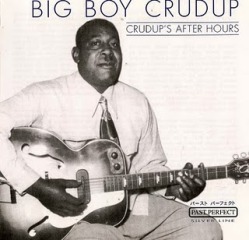Arthur 'Big Boy' Crudup - Crudup's After Hours (1946)
Arthur 'Big Boy' Crudup - Crudup's After Hours (1946)

01. She's Gone 02. That's All Right 03. So Glad you're Mine 04. You Got To Reap 05. I Want My Lovin' 06. Chicago Blues 07. I Don't Know It 08. Crudup's After Hours play 09. Train Fare Blues 10. Cry Your Blues Away 11. Crudup's Vicksburg Blues 12. Gonna Be Some Changes Made 13. Katie May 14. Hoodoo Lady Blues play 15. Hey Mama, Everythings All Right 16. Lonesome World To Me 17. Roberta Blues 18. Just Like A Spider 19. Some Day 20. That's Why I'm Lonesome Credits Bass – Ransom Knowling (tracks: 1-1, 1-2, 1-4, 1-6, 1-10, 1-12, 2-1, 2-3 to 2-8, 2-10 to 2-20) Drums – Armand "Jump" Jackson (tracks: 1-17, 1-18, 2-2, 2-9), Charles "Chick" Sanders (tracks: 1-15, 1-16, 1-19, 1-20),
Lawrence "Judge" Riley (tracks: 2-1, 2-3 to 2-8, 2-10 to 2-20), Melvin Draper (tracks: 1-5, 1-11, 1-13, 1-14) Guitar, Vocals – Arthur "Big Boy" Crudup (tracks: 1-1 to 2-20) Vocals [Bass Imitation] – Joe McCoy (tracks: 1-3, 1-7 to 1-9)
Arthur “Big Boy” Crudup (also known as “Pop” Crudup) (August 24, 1905 – March 28, 1976) was a delta blues singer and guitarist. He is best known outside blues circles for writing songs later covered by Elvis Presley (and since covered by dozens of other artists), such as “That’s All Right Mama”, “My Baby Left Me” and “So glad you’re mine”, and by many claims, “Blue Suede Shoes”.
Born in Forest, Mississippi and living and working in throughout the South and Midwest as a migrant worker for a time, he and his family returned to Mississippi in 1926. He sang gospel, then began his career as a blues singer around Clarksdale, Mississippi. He visited Chicago as member of the Harmonizing Four in 1939 and stayed there to work as a solo musician, but barely made a living as a street singer. Record producer Lester Melrose allegedly found him while he was living in a packing crate, introduced him to Tampa Red and signed him to a contract with RCA Victor’s Bluebird label.
He recorded with RCA in the late 1940s and with Ace Records, Checker Records and Trumpet Records in the early 1950s and toured throughout the country, specifically Black establishments in the South, with Sonny Boy Williamson II and Elmore James. He also recorded under the names Elmer James and Percy Lee Crudup.
Crudup stopped recording in the 1950s, however, after further battles over royalties. He returned to recording with Fire Records and Delmark Records and touring in the 1960s, sometimes labeled “The Father of Rock and Roll”, a title which he accepted with some bemusement. Throughout this time Crudup worked as a laborer to augment the small wages he received as a singer and non-existent royalties. Crudup returned to Mississippi after a dispute with Melrose over royalties, then went into bootlegging, and later moved to Virginia where he had lived and worked as a musician and laborer. In the early 1970’s, two local Virginia activists, Celia Santiago and Margaret Carter, both assisted him in attempting to gain Royalties he felt he were due, to little gain.
From the mid 60’s Crudup returned to bootlegging and working as an agricultural laborer, chiefly in Virginia, where he lived with his family including three sons and several of his own siblings. On the Eastern Shore of Virginia, while he lived in relative poverty as a field laborer, he occasionally sang and supplied moonshine to a number of drinking establishments, including one called the Dew Drop Inn, in Accomack County for some time prior to his eventual death, due to complications from heart disease and diabetes. (There was some confusion as to his actual date of death because of his use of several names, including those of his siblings.) He passed away in the Nassawadox hospital in Northampton County, Virginia, also on the Eastern Shore in 1976.
download: uploaded anonfiles mega 4shared mixturecloud yandex mediafire ziddu
Last Updated (Sunday, 01 September 2013 12:11)








